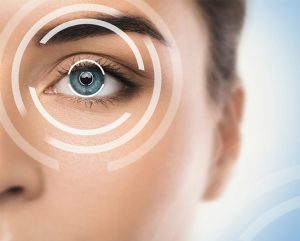 May is Healthy Vision Month, bringing attention to the importance of regular comprehensive eye exams. An eye exam is different from a vision screening, which is a visual acuity test that checks how well you see letters from a standard distance. Performed by nurses (or even volunteers), vision screenings may be useful in spotting certain very obvious problems, but do not provide the health details of a comprehensive eye exam. Eye exams are performed by optometrists and ophthalmologists, doctors experienced in diagnosing the earliest signs of eye disease and planning any needed treatment to help preserve vision.
May is Healthy Vision Month, bringing attention to the importance of regular comprehensive eye exams. An eye exam is different from a vision screening, which is a visual acuity test that checks how well you see letters from a standard distance. Performed by nurses (or even volunteers), vision screenings may be useful in spotting certain very obvious problems, but do not provide the health details of a comprehensive eye exam. Eye exams are performed by optometrists and ophthalmologists, doctors experienced in diagnosing the earliest signs of eye disease and planning any needed treatment to help preserve vision.
What You Don’t Know Can Hurt Your Vision
Having regular eye exams works to discover diseases before they have a chance to severely impair vision. The good news about eye diseases is that, when caught and treated early, most of the damage they cause can be prevented, minimized, halted or, in some cases, reversed. Therefore, it’s crucial to get regular comprehensive exams while your eyes are feeling fine, to help ensure they remain healthy and able to capture life’s wonders, year after year.
Sadly, many people do not have regular eye exams. Of the country’s projected 93 million adults considered to be at high risk of vision loss, only half have seen an eye doctor in the past twelve months, leaving millions with the prospect of serious and often permanent eye damage.
“People usually get their vision checked when they realize they need a change in their lens prescription,” says ophthalmologist Dr. Jose Vazquez. “And many are under the impression that this vision test will reveal any eye disease that might be developing, or that an eye disease will produce symptoms. However, many serious eye diseases are stealthy and produce no early symptoms that either the patient will notice or an optician will be able to identify during a vision test. That’s why it’s imperative to have regular comprehensive exams where your pupils are dilated so we can check for any increase in eye pressure, and discover early changes to the cornea, lens, macula, retina and other structures that may require treatment to help prevent vision loss and keep eyes functioning optimally.”
What’s Included in the Exam
A comprehensive eye exam includes a review of your personal history, and testing for visual acuity, depth perception, color recognition, eye alignment and movement, light response and peripheral vision. Your doctor will examine the curvature of your corneas and measure any refractive errors, such as near-sightedness, farsightedness or astigmatism, so that corrective lenses can be prescribed if needed. “A comprehensive eye exam can also reveal overall health problems people don’t even know they have,” says optometrist Dr. Alexandria Rawls. “I have been able to catch high blood pressure and diabetes in a few patients, which motivated them to seek treatment from their primary care physicians.”
A dilated exam also allows for the early discovery of disease and helps to prevent possible blindness related to:
. Cataracts – the #1 cause of vision loss in the U.S.
. Glaucoma – a group of diseases affecting the optic nerve
. Diabetic retinopathy – the country’s #1 cause of blindness in adults
. Age-related macular degeneration – a condition that can be managed before vision loss becomes severe
Finding these problems before they produce symptoms and permanently damage vision is the key to preventing or limiting vision loss.
Appointment Recommendations for Adults
The following guidelines offer the best protection from sneaky, vision-robbing conditions. For adults at average risk, see your eye doctor for a comprehensive exam as follows:
20-39: every 5-10 years
40-54: every 2-4 years
55-64: every 1-3 years
65+: every 1-2 years
People at higher risk of developing glaucoma, including all adults ages 60 and older, those with a family history of the disease, and African Americans over 40, should have a dilated eye exam every two years.
If you have diabetes or another chronic condition that affects your eyes, or have a family history of eye disease, you should have a comprehensive eye exam once a year, or as recommended by your eye doctor.
When to Call Your Doctor
If you develop any of the following symptoms, don’t wait for your next appointment – call your eye doctor immediately if you experience:
. Eye pain
. Decreased vision
. Double vision
. Floaters (squiggles or specks that float across visual field)
. Flashes of light
. Halos around light sources
. Draining or unusual redness of the eye
Taking routine steps to care for your eyes will help them remain clear, healthy and functioning their best. If you haven’t had a comprehensive eye exam in a while, don’t wait for problems to develop – schedule an appointment now.
Looking out for your eyes today will help them continue to perform brilliantly through the years to come.
Lake Eye
352-775-1533 | LakeEye.com
 Central Florida Health and Wellness Magazine Health and Wellness Articles of the Villages
Central Florida Health and Wellness Magazine Health and Wellness Articles of the Villages



